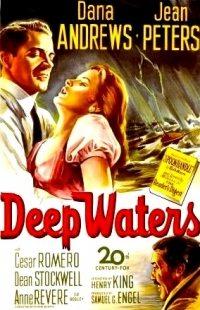
The Big Blue is a 1988 drama film in the French Cinéma du look visual style, made by French director Luc Besson. It is a heavily fictionalized and dramatized story of the friendship and sporting rivalry between two leading contemporary champion free divers in the 20th century: Jacques Mayol and Enzo Maiorca, and Mayol's fictionalized relationship with his girlfriend Johana Baker.
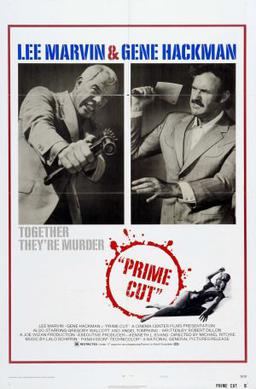
Prime Cut is a 1972 American action crime film produced by Joe Wizan, directed by Michael Ritchie from a screenplay written by Robert Dillon, and starring Lee Marvin, who portrays a mob enforcer from the Chicago Irish Mob sent to Kansas to collect a debt from a meatpacker boss played by Gene Hackman. The picture co-stars Sissy Spacek in her first credited on-screen role as a young orphan being sold into prostitution as well as Angel Tompkins and Eddie Egan.
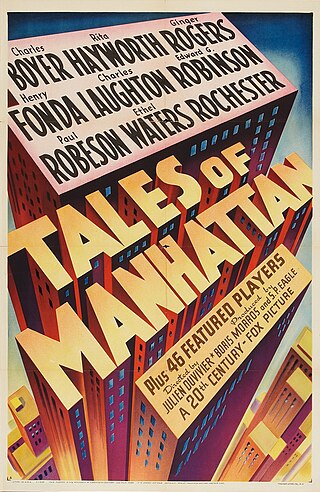
Tales of Manhattan is a 1942 American anthology film directed by Julien Duvivier. Thirteen writers, including Ben Hecht, Alan Campbell, Ferenc Molnár, Samuel Hoffenstein, and Donald Ogden Stewart, worked on the six stories in this film. Based on the Mexican writer Francisco Rojas González's novel, Historia de un frac, which he was not credited for, the stories follow a black formal tailcoat cursed by a cutter as it goes from owner to owner, in five otherwise unconnected stories.
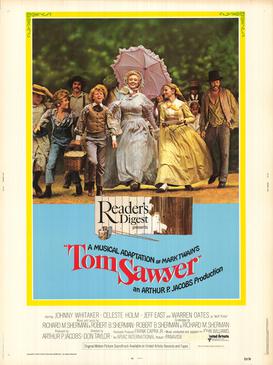
Tom Sawyer is the 1973 American musical film adaptation of the Mark Twain novel The Adventures of Tom Sawyer and was directed by Don Taylor. The film was produced by Reader's Digest in collaboration with Arthur P. Jacobs, and its screenplay and songs were written by both Robert B. Sherman and Richard M. Sherman.
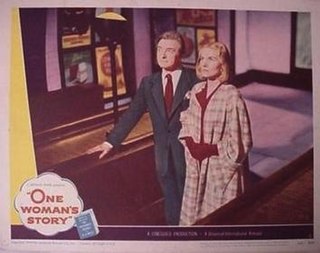
The Passionate Friends is a 1949 British romantic drama film directed by David Lean and starring Ann Todd, Claude Rains and Trevor Howard. The film is based on The Passionate Friends: A Novel (1913) by H. G. Wells. It describes a love triangle in which a woman cannot give up her affair with another man. The film was entered into the 1949 Cannes Film Festival.

Let George Do It! is a 1940 British black-and-white comedy musical war film directed by Marcel Varnel and starring George Formby. It was produced by Michael Balcon for Associated Talking Pictures and its successor, Ealing Studios, and distributed in the UK by ABFD. This was the first comedy from this studio to deal directly with the Second World War.

Detective Conan: Jolly Roger in the Deep Azure is a Japanese animated feature film released on April 21, 2007. It is the 11th film in the Case Closed series. This film brought in 2.53 billion yen.

Port of Seven Seas is a 1938 American drama film starring Wallace Beery and featuring Frank Morgan and Maureen O'Sullivan. The movie was written by Preston Sturges based on the plays of Marcel Pagnol and the films based on them, and was directed by James Whale, the director of Frankenstein (1931) and The Invisible Man (1933). The cinematography is by Karl Freund, who filmed Fritz Lang's Metropolis (1927) and I Love Lucy (1951-1957).
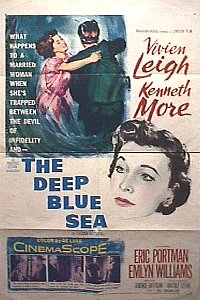
The Deep Blue Sea is a 1955 British drama film directed by Anatole Litvak, starring Vivien Leigh and Kenneth More, and produced by London Films and released by Twentieth Century Fox. The picture was based on the 1952 play of the same name by Terence Rattigan.

The Sea Prince and the Fire Child is a 1981 Japanese anime film by Sanrio, based on a story by Shintaro Tsuji. It is said to be a loose retelling of Romeo and Juliet, itself a European version of many tales of star-crossed lovers in a variety of cultures and eras. In this story, the children of the gods of fire and water fall in love and fight to stay together in the face of adversity.
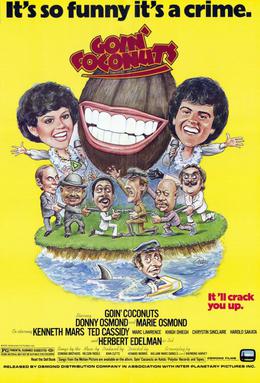
Goin' Coconuts is a 1978 American musical adventure comedy film directed by Howard Morris and starring Donny and Marie Osmond. The feature film tells a tale of Donny and Marie becoming embroiled in a dispute between two criminal gangs over a necklace while they visit Hawaii to perform in a concert. Released in theaters on October 18, 1978, it was both a critical and commercial failure.

Mirage is a 1965 American neo noir thriller film directed by Edward Dmytryk from a screenplay by Peter Stone, based on the 1952 novel Fallen Angel, written by Howard Fast under the pseudonym Walter Ericson; the novel is not credited by title onscreen. The film stars Gregory Peck, Diane Baker, Walter Matthau, George Kennedy, Leif Erickson, and Kevin McCarthy, and was released by Universal Pictures.

My Best Girl is a 1927 American silent romantic comedy film directed by Sam Taylor starring Mary Pickford and Charles "Buddy" Rogers that was produced by Pickford. Rogers later married Pickford. Charles Rosher received an Academy Award nomination for his cinematography of this film in 1928. The film is extant and was screened at the Eastman Museum in 2015.

The Good Fairy is a 1935 romantic comedy film written by Preston Sturges, based on the 1930 play A jó tündér by Ferenc Molnár as translated and adapted by Jane Hinton, which was produced on Broadway in 1931. The film was directed by William Wyler and stars Margaret Sullavan, Herbert Marshall, Frank Morgan and Reginald Owen.

Pink String and Sealing Wax is a 1945 British drama film directed by Robert Hamer and starring Mervyn Johns. It is based on a play with the same name by Roland Pertwee. It was the first feature film Robert Hamer directed on his own.

Ondine is a 2009 Irish romantic drama film written and directed by Neil Jordan and starring Colin Farrell and Alicja Bachleda. The film was shot on location in Castletownbere, and it touches upon the possible existence of the mythological selkie bringing hope and love to humanity.

Maria's Lovers is a 1984 American drama film directed by Andrei Konchalovsky and starring Nastassja Kinski, John Savage, and Robert Mitchum. The plot follows a soldier returning from World War II who marries the woman of his dreams, but he is unable to consummate his marriage, ruining the couple's chances of a shared happiness. The film is the first American feature film by Konchalovsky and opened the 41st Venice International Film Festival. Maria's Lovers also was nominated César Award for Best Foreign Film.

Shark Attack 3: Megalodon is the second sequel to Shark Attack, released in 2002 direct-to-video. The film is notable for featuring John Barrowman, who later found fame in popular shows such as Doctor Who and Torchwood. Barrowman has said in an interview on Friday Night with Jonathan Ross that he only did the film for the money, and was rather embarrassed when a clip from the film was shown. Actress Jenny McShane from the first Shark Attack film has a starring role, albeit as a completely different character.

Nobody's Fool is a 1936 American comedy film directed by Arthur Greville Collins and written by Ralph Block, Ben Markson, and Jerry Sackheim. The film stars Edward Everett Horton, Glenda Farrell and Cesar Romero. The movie's working title was "Unconscious". It was released by Universal Pictures on June 1, 1936. A naive country boy goes to New York City where he gets mixed up with real estate swindlers.
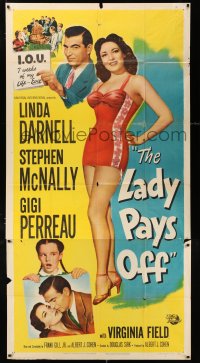
The Lady Pays Off is a 1951 American romantic comedy film starring Linda Darnell, Stephen McNally and Gigi Perreau, and directed by Douglas Sirk. A teacher finds herself with a large gambling debt that she has to pay off in an unusual way.
